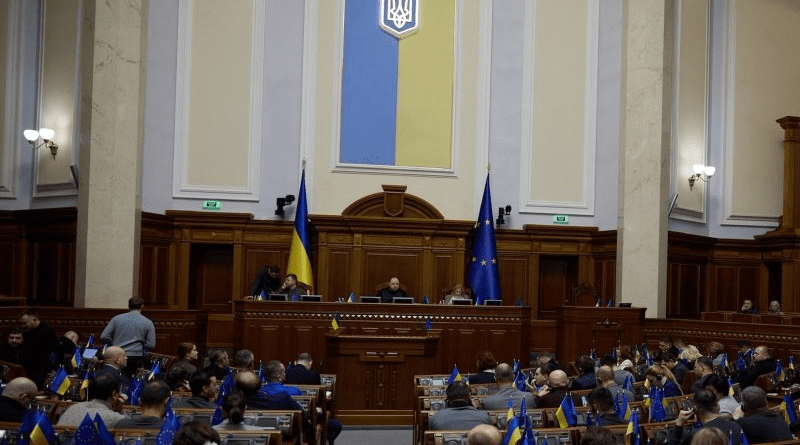Ukraine Rushing To Show Progress On EU-Bound Reforms
By EurActiv
By Alexandra Brzozowski
(EurActiv) — Ukraine is pressing ahead with reforms like never before, despite the ongoing war, Deputy Prime Minister Olha Stefanishyna told EURACTIV as Kyiv is racing to demonstrate progress in the face of growing signals that it is unlikely to get preferential treatment on its EU path.
“European integration has been now the major instrument of unity within the country – 91% of our people support it, there is full mobilisation and unity in the Ukrainian parliament, in the government, and full mobilisation within the administration,” Stefanishyna said.
“It is very important to preserve these dynamics and an early assessment will help us to keep on moving in the correct direction,” she added.
“We keep talking about fast-track membership because Ukraine is fast – we will do our planning and preparation to be ready when the time comes.”
The European Commission recommended EU candidate status for Ukraine in June on the understanding that Kyiv undertakes a series of legislative and policy steps, dubbed the seven recommendations.
These recommendations included enacting legislation on a selection process for the country’s Constitutional Court judges on a competitive basis, strengthening the fight against corruption, harmonising media regulation with EU standards, and protecting national minorities.
Reforms on the way
Ukraine’s parliament speaker Ruslan Stefanchuk said last week the assembly had passed all the legislation set by the EU and necessary for Kyiv to start talks on joining the bloc.
“We can say with confidence that the Verkhovna Rada has completed its part of the work and adopted all the necessary systemic bills to implement the recommendations of the European Commission,” Stefanchuk said in a statement.
Speaking to EURACTIV in Kyiv in early December amid the parliamentary votes, Stefanishyna said she hoped the EU executive would provide an assessment soon and that there would be an “understanding that Ukraine has significantly advanced in deliberating on major elements of all seven recommendations”.
“At this stage, Ukraine demonstrates that we are capable of reforming throughout the war, and we show that reforming is needed first and foremost for us, not only because the EU accession process demands it,” Stefanishyna said.
“There is a significant will to finally start the reforms which have never been supported by whatever political leaders there were in Ukraine and this should be taken into account by EU member states’ capitals,” she added.
But some experts in Ukraine said the legislation approved by parliament was only a starting point, explaining that some of the laws could need revising or additional legislation would be required to meet EU criteria.
“Kyiv really is demonstrating progress in satisfying all the European Commission’s recommendations, but none of them has been fully implemented,” three experts from the Reanimation Package of Reforms, which groups non-governmental organisations and experts on reform, wrote in Ukrainska Pravda.
Instead of doing them right, they wrote, Kyiv would be doing them fast.
Spring assessment
The European Commission initially said in its June opinion on granting candidate status that it will monitor Ukraine’s progress in carrying out the recommended steps and report on them by the end of 2022.
In June, EU leaders instead decided this would be done no earlier than as part of the EU’s regular enlargement package next October, which will feature the eastern trio – Ukraine, Moldova, and Georgia – for the first time.
“There seems to have been a conscious decision made not to go ahead with an early option, especially because realistically the time to draw up such an update was simply too short to have something substantial,” an EU official told EURACTIV.
“Politically, we cannot give the impression of extra treatment compared to other candidate countries either,” the official added.
For Ukraine, a smaller battle on the way to next autumn, meanwhile, was won last week.
In what is a likely attempt to send a positive signal to Kyiv, the European Commission is now set to preliminarily assess Ukraine’s progress in implementing the seven recommendations by spring 2023.
European affairs ministers agreed to the Commission’s intention to assess Ukraine’s progress last week.
This update would come in addition to the regular assessment done as part of the Commission’s annual enlargement package regularly published in October.
EU member states wrangled over the decision whether to do this earlier, as an additional update, until the last minute, according to several EU diplomats with knowledge of the matter.
“For some member states, and one in particular, it was very important to call this an ‘update’ with no specification on the objective,” one EU diplomat said.
Acquis alignment
Beyond the progress on the seven recommendations, the European Commission is also expected to soon present a technical opinion on Ukraine’s fulfillment of the bloc’s acquis communautaire, meaning how well the candidate country’s legislation is aligned with EU law.
“For us, this is really important, because this will show us the baseline for our accession talks, and after it’s released we will start already preparing our further position for negotiations,” Stefanishyna said.
However, according to EU sources, the Commission’s technical opinion, initially planned for December, has been pushed towards early next year.

